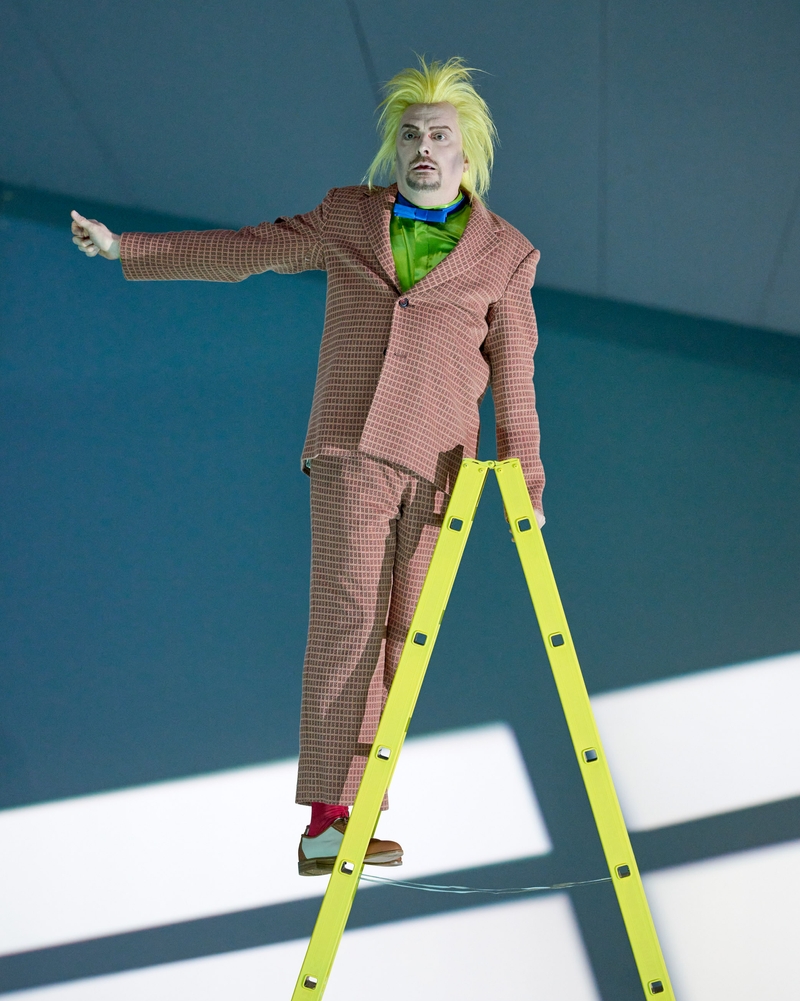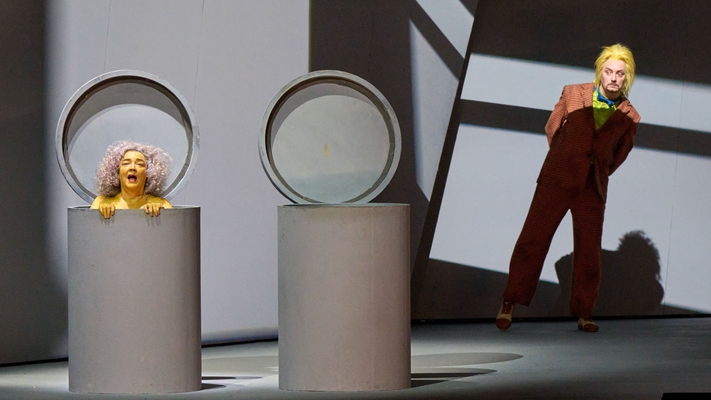An exaggeration of the everyday?
News |
Of the thousands and thousands of operas that have been created since the genre was created, it is well known that only a vanishingly small number have been able to remain in the repertoire permanently, or at least for a long time. Fin de partie, György Kurtág's exquisite musical theater debut premiered in 2018, has what it takes to become part of this classic repertoire: The large number of stages that have performed the work since then, the consistently reliable approval from audiences and, not least, the acclaimed premiere production at the Vienna State Opera a year ago underline this finding.
In any case, Kurtág succeeded in perfectly capturing Samuel Beckett's play of the same name, one of the prime examples of the Theater of the Absurd, in music: In an ideal way, the enigmatic, the deliberately unspecific, the black humor that refuses to be interpreted in terms of content is brought to life and made intensely tangible.
To get you in the mood for the series of performances in September and October, we bring you scene photos of important moments in the "plot". Georg Nigl, who will once again be playing the servant Clov, has commented on the respective situations from his point of view and in keeping with the idea of absurd theater.
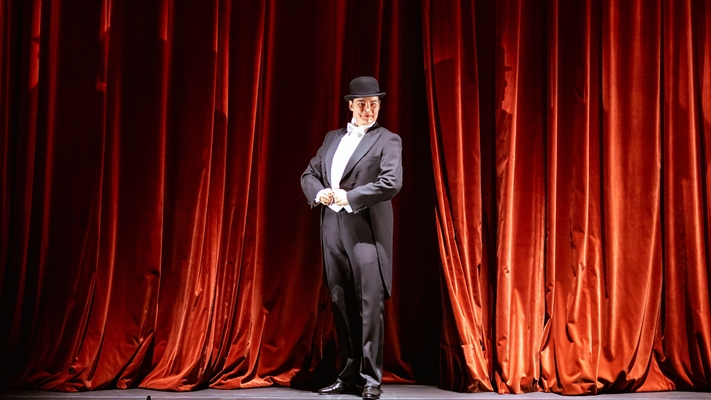
"Here we go! This first scene of the evening in front of the still closed but already illuminated curtain always reminds me a little of the animal tamer in the prologue of Alban Berg's Lulu or a conferencer in Punch and Judy's theater or Tonio in Pagliacci: through the intermediary function of a stage character, the audience is drawn into the magical maelstrom of the action.
At the same time, I realize - and this creates the adrenaline rush necessary for a performance - that when the singer steps in front of the curtain, there is no escape for me behind the curtain either: here we go!"
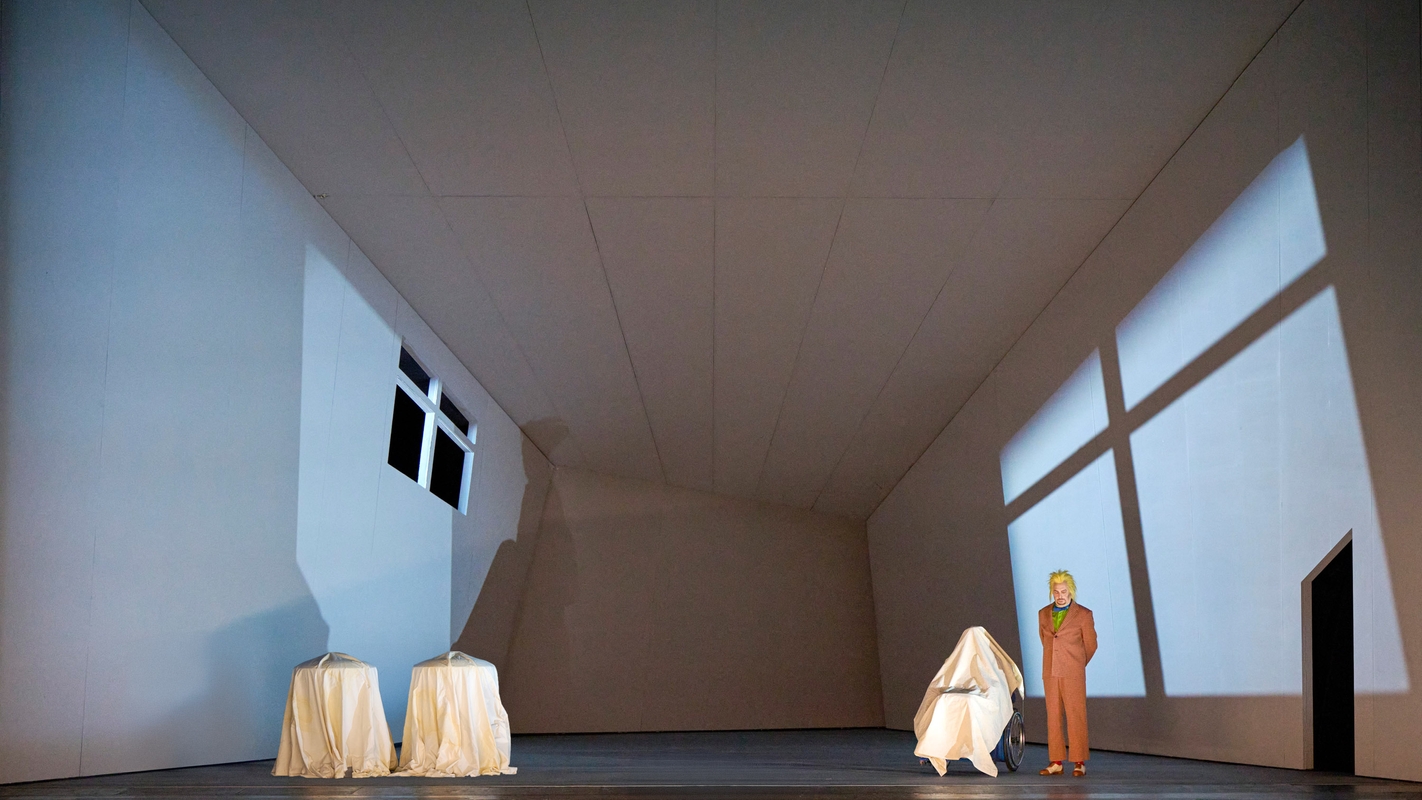
"What the audience sees after the curtain opens seems to me like an absurd experimental set-up. Although now, when I look at the picture and am put in the role of the audience, I naturally get a completely new and different impression than at the moment of the performance, when I seem to come out of an opening on the right, like a mouse.
In any case, the audience is looking into a kind of giant shoebox: two covered garbage cans, perhaps reminiscent of the surface of a boat or components of an air conditioning system on the roof of a modern high-rise building, dominate the scene in the foreground; the only functioning connection to the outside world can be seen on the right, used exclusively by the one of the four actors who can move: By me aka Clov. It is remarkable how closely Herbert Fritsch, in his dual role as director and set designer, has ultimately adhered to the stage directions of the original."
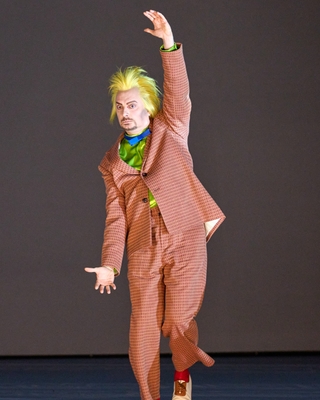
"The wrong meter! I've only just moved house with my family in real life, so I know how often you have to look for the misplaced tape measure. Clov seems to be no different when trying to measure the window. But his ability to estimate the right measurements must be finite. Or is it something else entirely? Is Clov perhaps wondering whether the window cross is high enough to hang himself from? No way out either - he won't do it."
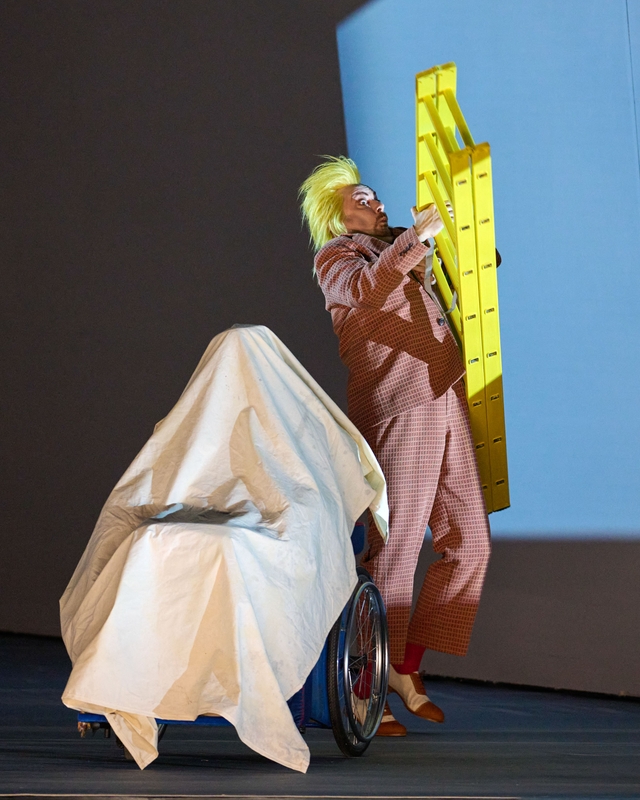
"Danger! This is one of my favorite scenes, but it's a tough one: The ladder is really heavy and I have to be careful not to hit Hamm on the head. Nevertheless, I really enjoy playing the ladder performance night after night - always with little improvisations."

"The symbolic ladder could be understood in the metaphorical sense of Friedrich Nietzsche. And on this ladder stands the philosophizing clown, the fool, who ultimately speaks the truth. On the other hand, this ladder ultimately overcomes nothing and, in keeping with the understanding of the Theater of the Absurd, remains meaningless.
Personally, I am always worried at this moment that I might fall off. I'm not afraid of hurting myself physically, but I feel the theatrical responsibility. After all, we are only at the beginning of the action. The audience and I (Clov) are face to face - if something unforeseen goes wrong, we lose our connection to the audience right at the beginning."
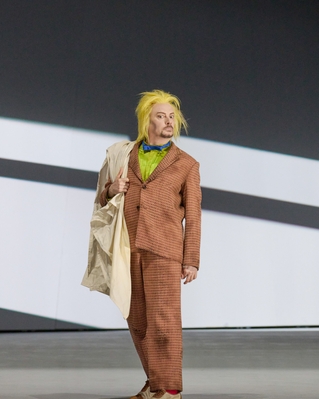
"I've taken off the sheets and the garbage cans are now recognizable to everyone in all their scurrility. My association: the toga of the 'Great Caesar'."
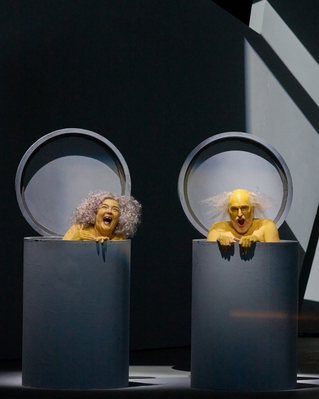
"A good photo. Not least this window cross, which seems to hover over the couple like a religious symbol and immediately makes me think of Mary and Joseph. Although they have nothing at all to do with Mary and Joseph: There are two parents who have absolutely nothing more to say to each other. And what happens?
The husband tells an endlessly long, bad joke and he tells it so badly that the wife dies from it. How do you come up with an idea like that? Samuel Beckett must have had a very special family constellation..."
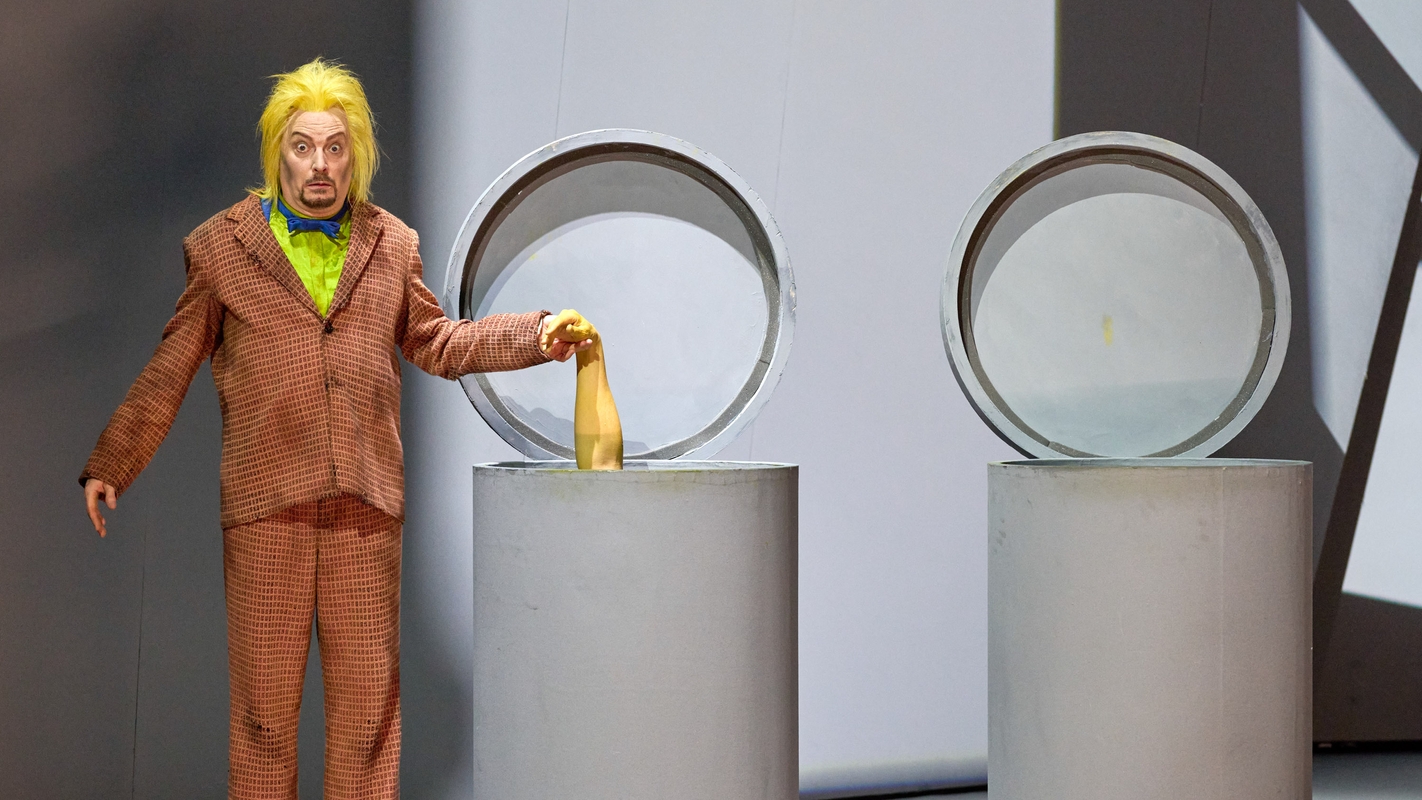
"Clov has overcome himself and come so close that he can feel Nell's pulse. In other words, he can't feel it because she has died in the meantime. So Nell has made it! But the performer of the role was also the first to get through the current performance with this moment."
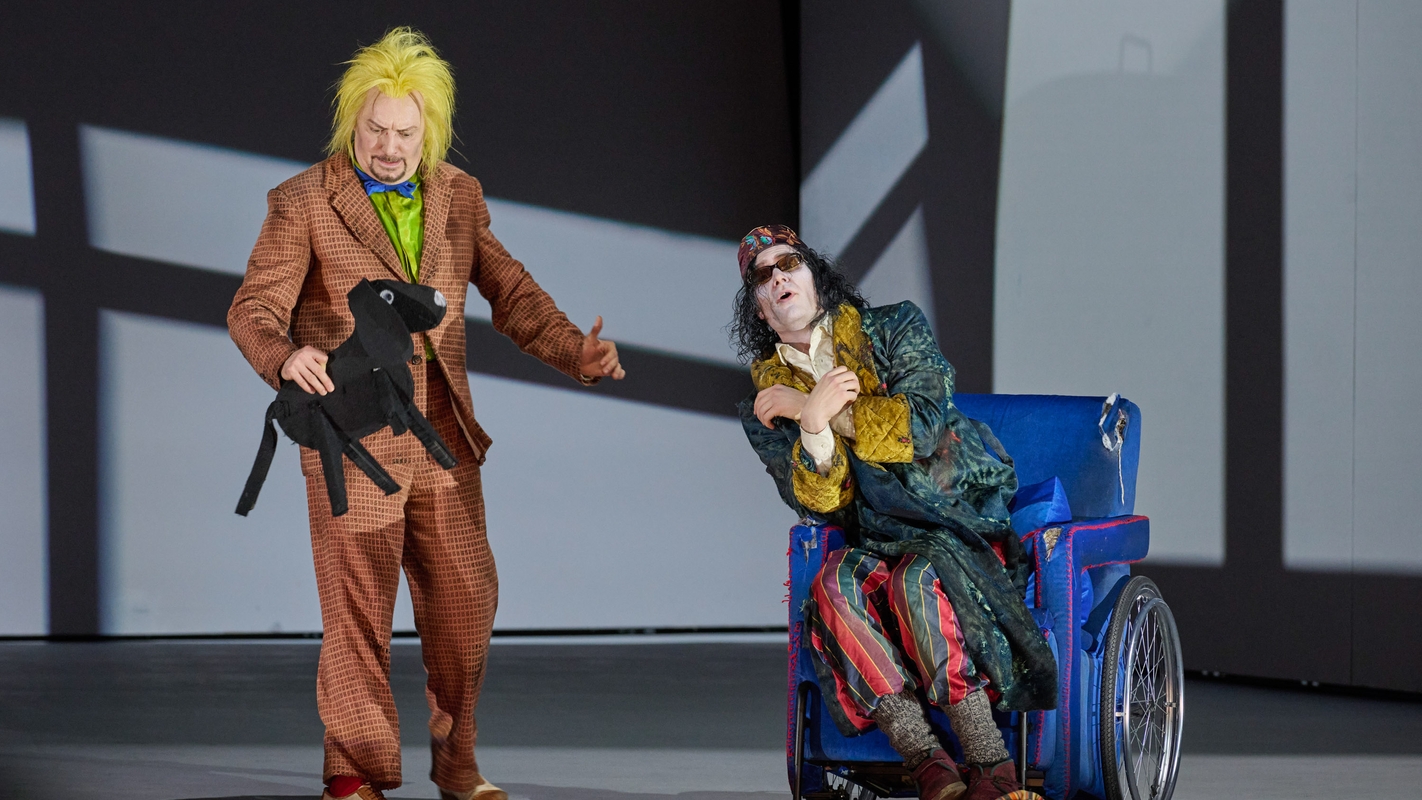
"The black dog that Clov holds in his hand here has an important function in Beckett's play as a kind of fetish. In György Kurtág's setting, he has essentially been left out.
At least for the time being, as the almost 100-year-old composer described the score as a "versione non definitiva", a "provisional version". Changes can therefore not be ruled out..."
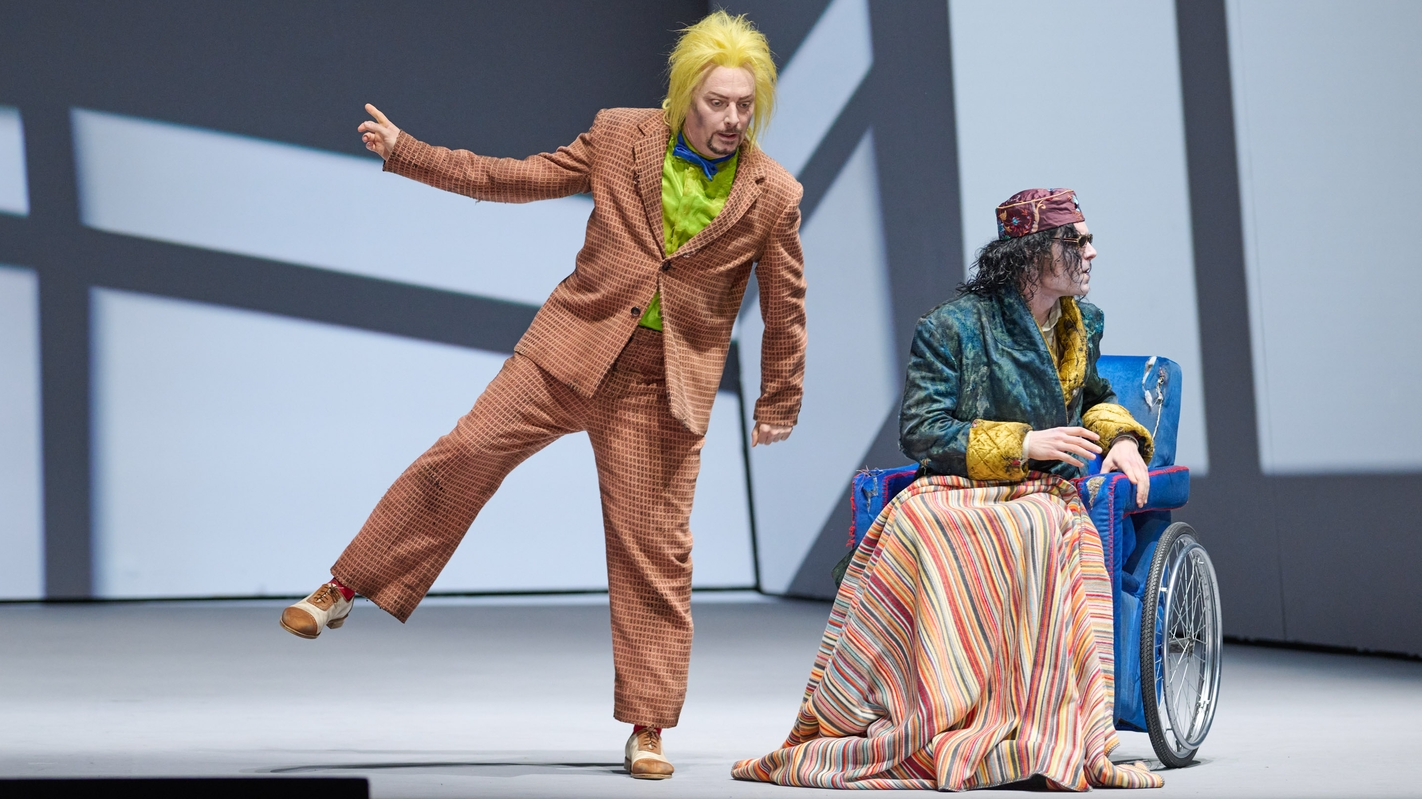
"You lie to yourself all the time. For example, I don't believe that the rat Clov claims actually exists. For an immobile person like Hamm, who wouldn't be able to defend himself against being attacked, a rat is definitely a threat. The mere existence of this animal would give the only mobile actor, Clov, a tremendous increase in power over Hamm: he could protect him if the worst came to the worst - or not...
But in truth, Clov would also like to flee because he doesn't know what's going on "outside" either. After all, we humans are flight animals. And this pressure of not knowing what you might be up against creates a completely dysfunctional situation. The question arises as to what extent the entire human community is not dysfunctional and this play or opera is merely a kind of exaggeration of the everyday for us? Just the other day, I happened to be walking behind a woman on the street who was texting on her cell phone.
So she wasn't really there at all. Humanity is currently undergoing a process of transformation from real togetherness to virtual togetherness via a screen. This creates a distance that contributes to the fact that no one can react authentically and directly to the other. In fin de partie, the actors can no longer react to the other person in a meaningful way either. But for different reasons: Here, the confrontation with the you, but also with one's own self, has become unbearable."
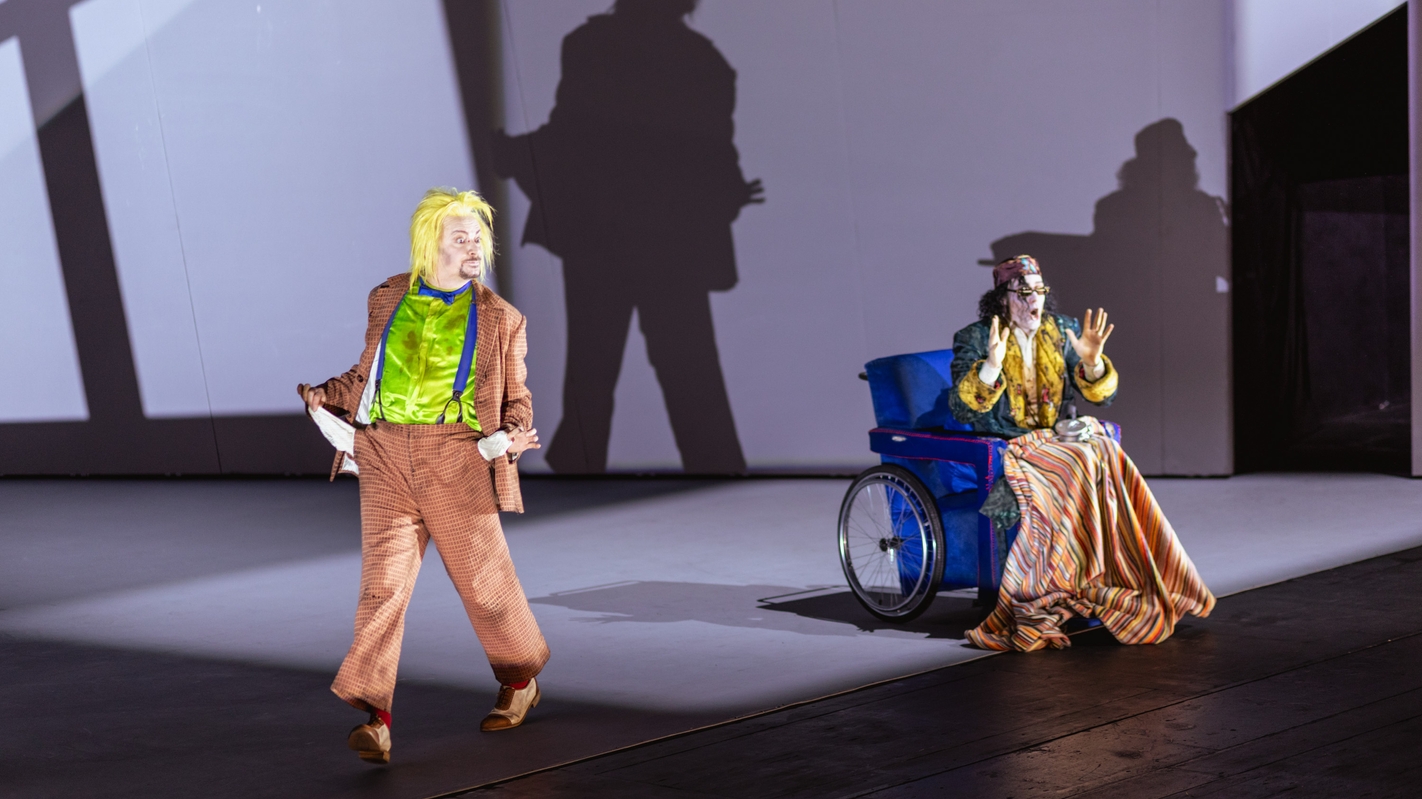
"Clov looks like a legitimate descendant of Buster Keaton, Stan Laurel & Oliver Hardy or Charlie Chaplin. Not least the eye-catching shoes remind me of these greats of film history. And another important thought from this scene for me: 'The last shirt has no pockets'!"
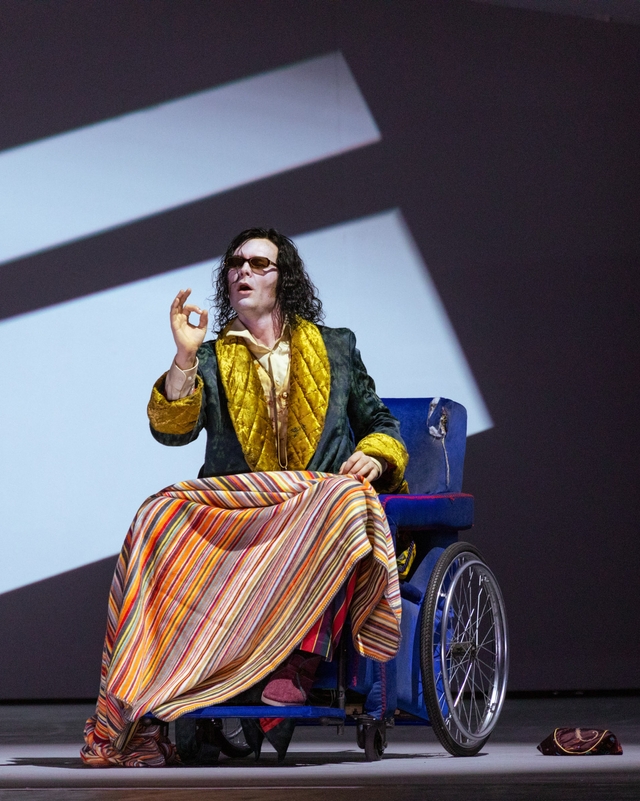
"I'm not present here myself. My colleague Philippe Sly has to master a huge amount of text and music on his own. The greatest respect for this achievement!"
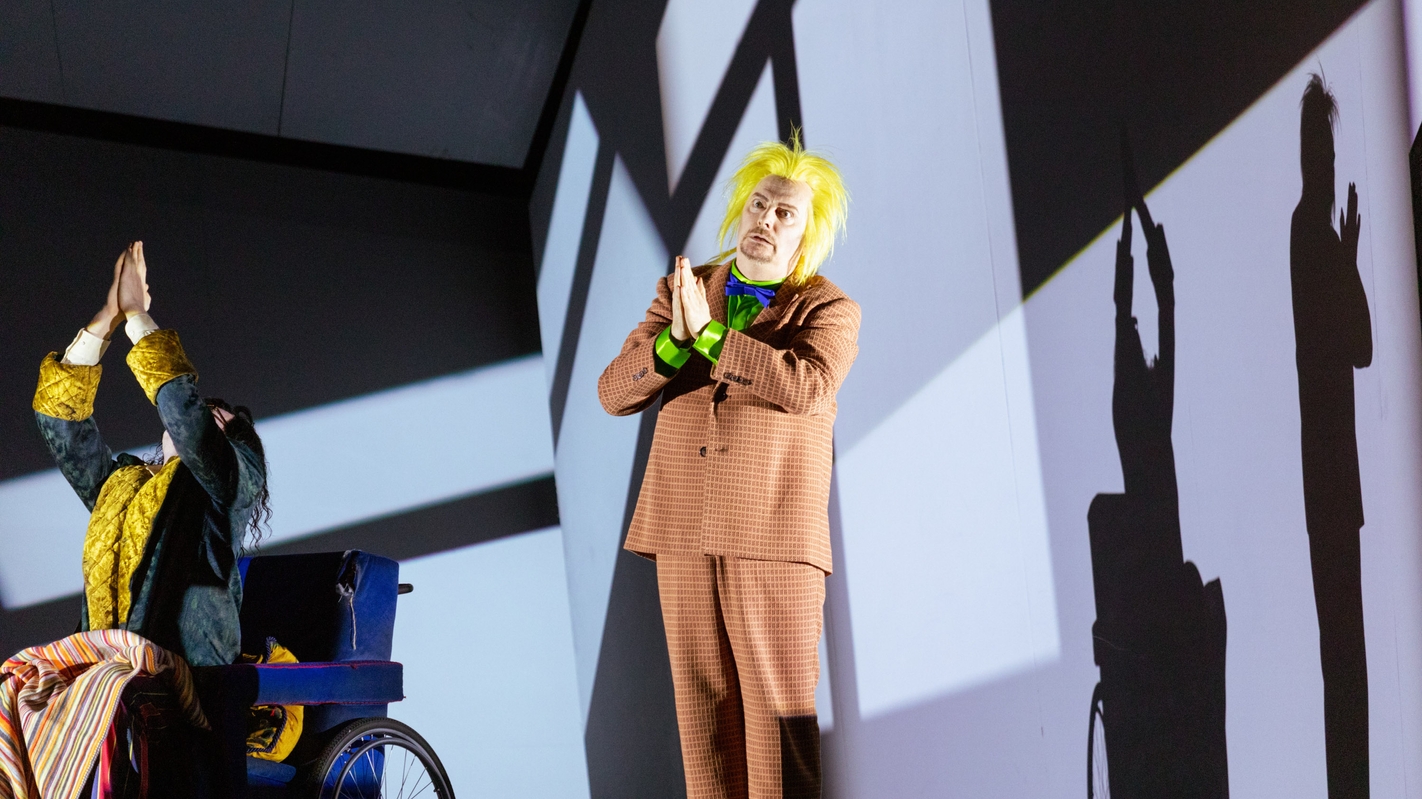
"I misunderstood this scene for a relatively long time: I initially thought Clov was praying that everything would end as soon as possible. But it's more a case of the two of them praying together - for nothing. Or about discovering something in common after all?"
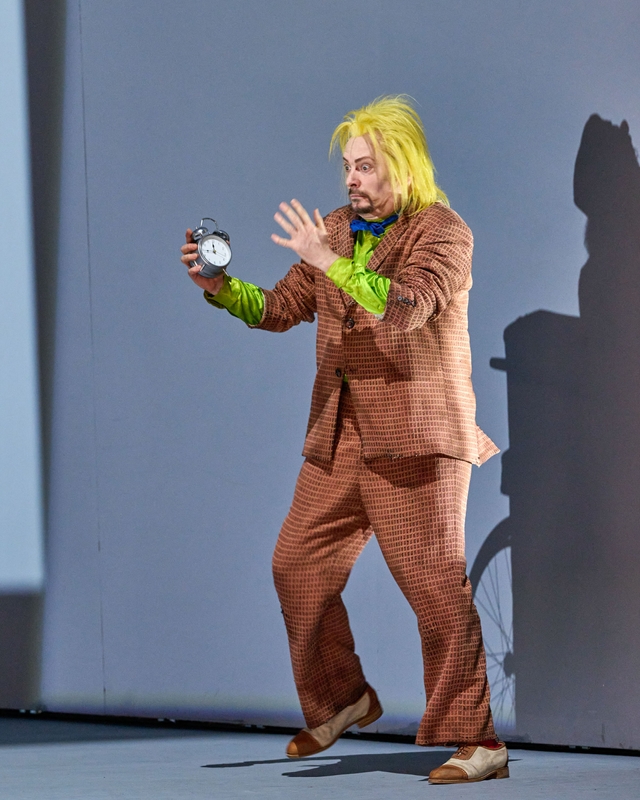
"As I said, we are flight animals and the ticking clock is constantly driving us forward like a time bomb, causing constant anxiety. But this image also reminds me not to take out the notes of this difficult score too late to study and repeat them."
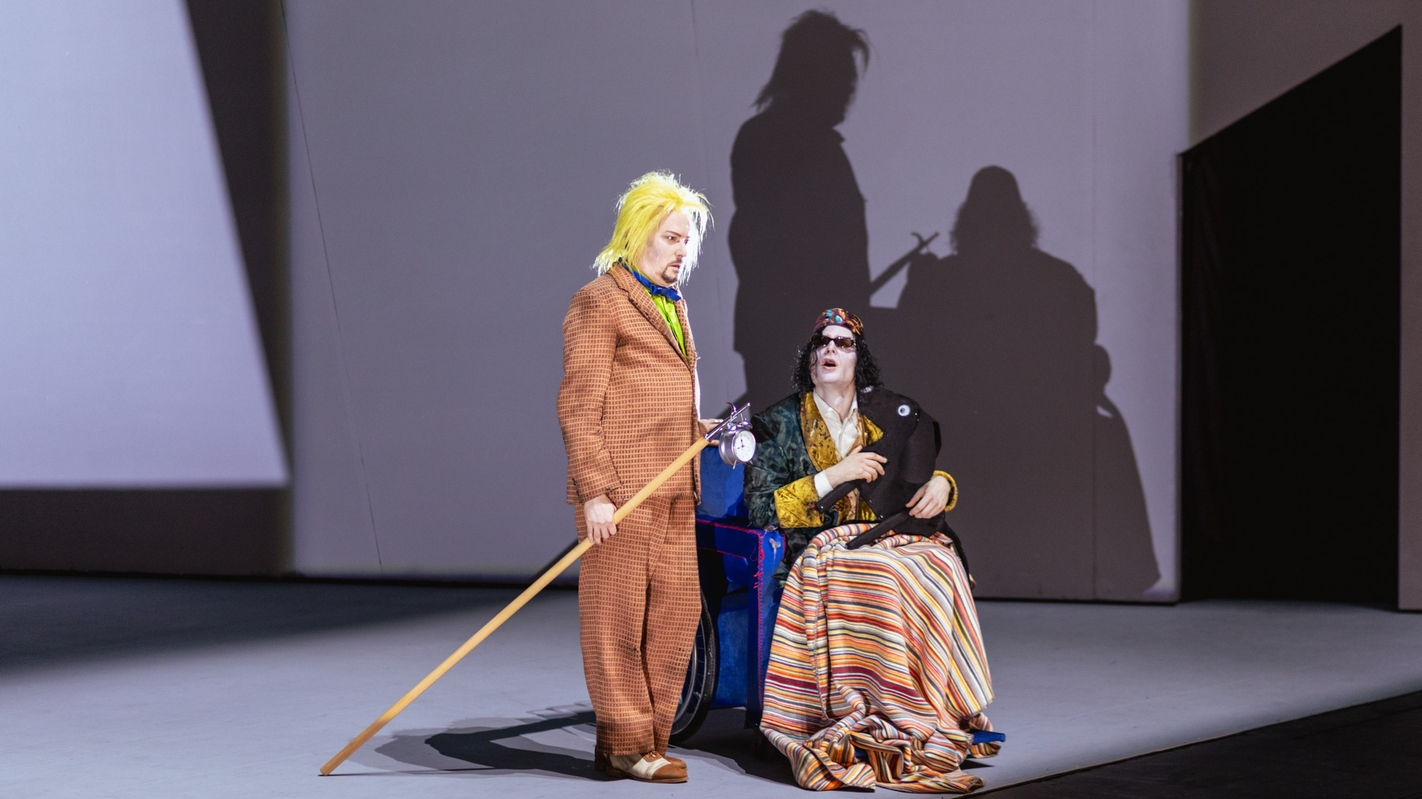
"A very symbolic and therefore ambiguous scene! The hook of this curtain rod reminds me of Moby-Dick, for example, the clock of Captain Hook in Peter Pan, the rod itself of the rudder of Charon, but also of the deadly halberd of a Beefeater in front of the Tower of London. In short: the menacing shadows on the back wall reveal this moment to be subliminally extremely aggressive, even if it appears very calm at first glance."
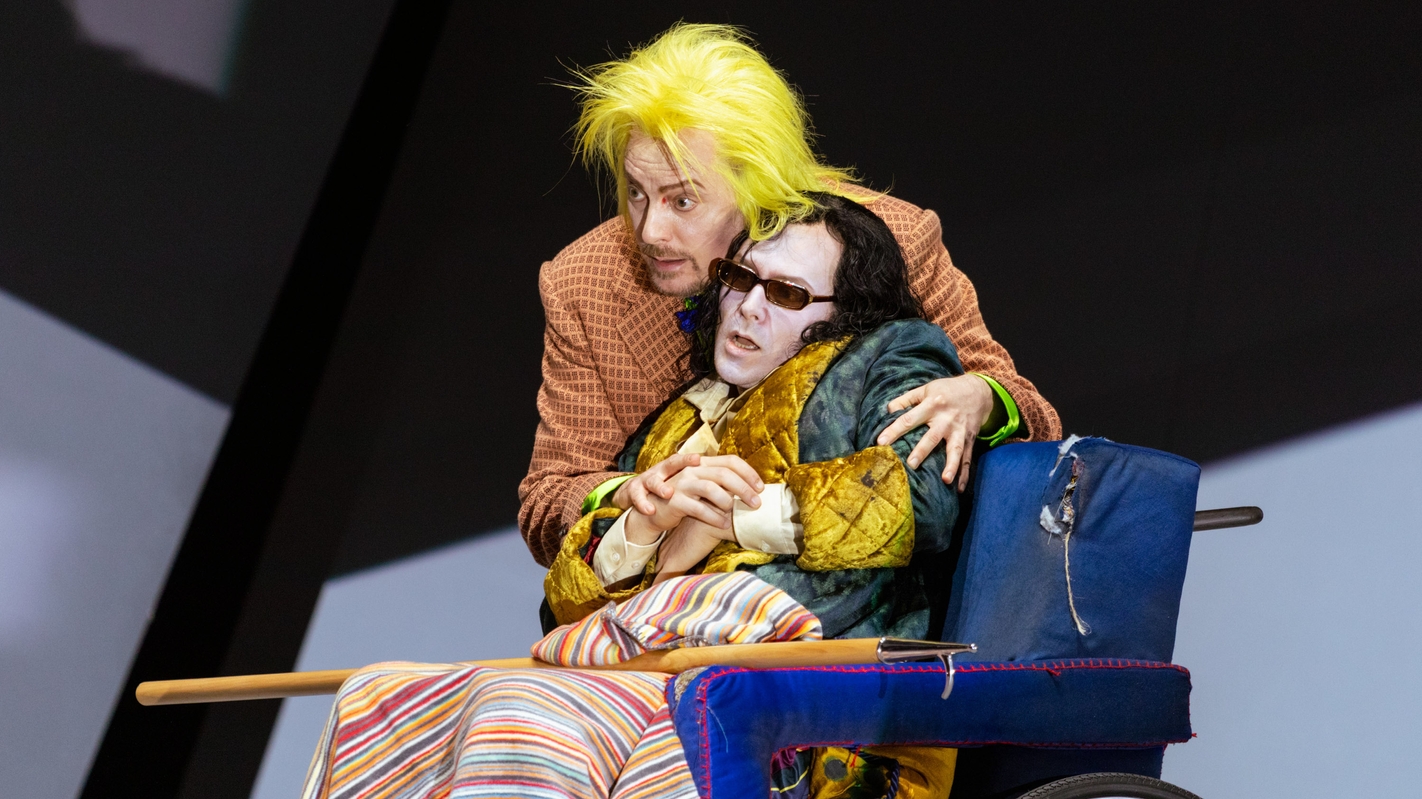
"Sasha Waltz once said to me: 'Never play just one thing! And that's true: There is no such thing as the purity of one thought and you shouldn't obsessively try to create it. Not on stage and not anywhere else. This scene, for example, almost creates the appearance of closeness, compassion and kindness. But in truth, it's bubbling under the surface. It's hardly about love. It's more about wanting to kill. Or about dependency. Or a desire to dominate, to torment the other..."
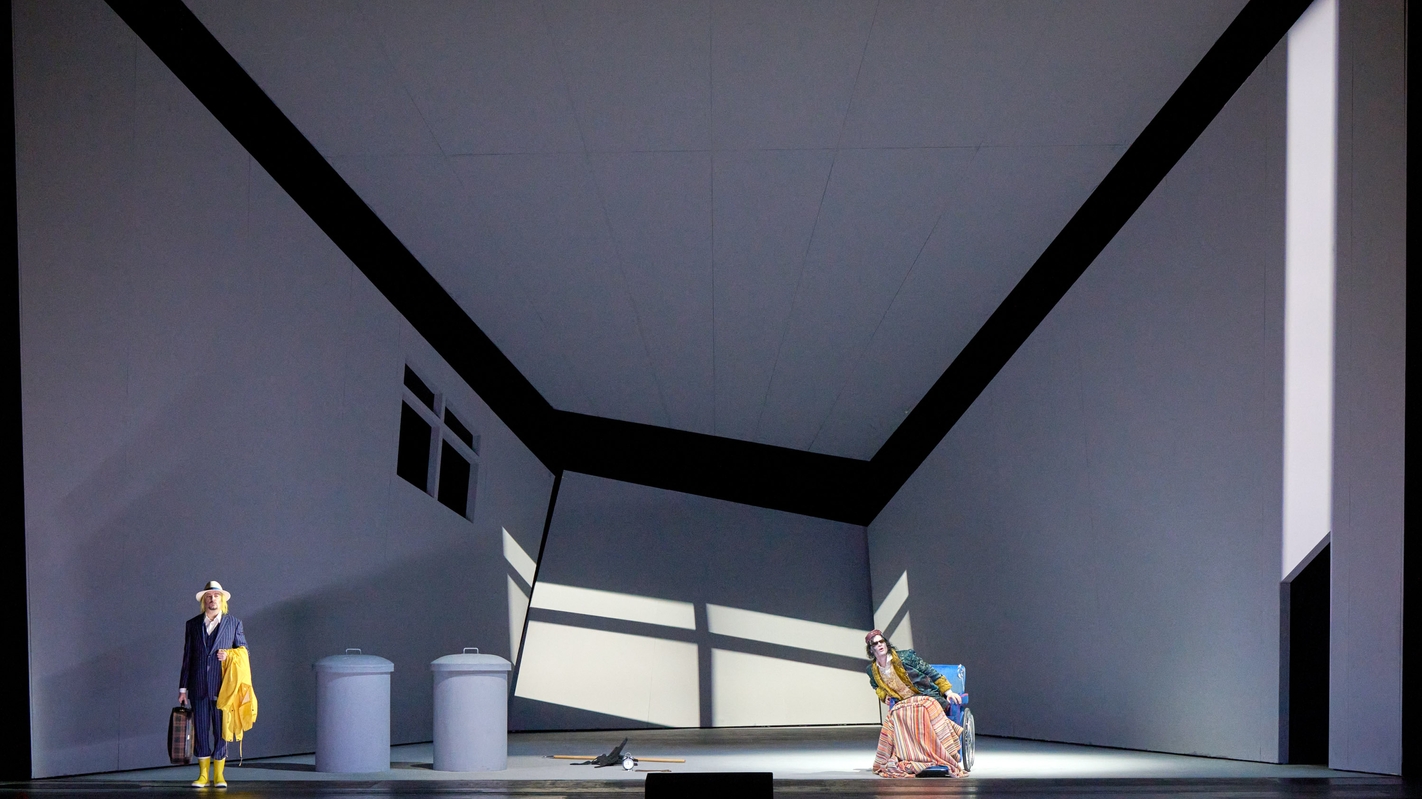
"A final stroke? Two people were forced to live closely together with the person they could least stand. But now they can't live without each other either. So the separation comes too late. Clov finally wants to leave. The only question is how far he will get.
I deliberately don't think so. The play is simply over. The challenge for me at this point is to keep my gaze fixed on something the whole time so that the eyes don't move and thus take the audience's focus away from Hamm. (In a scene like this, the audience would notice the slightest movement) This immobility is uncomfortable because you are literally standing close to the abyss: right next to the orchestra pit."
Brief content
Four figures vegetate in a hostile, almost uninhabitable landscape: Clov and Hamm, Nagg and Nell.
Hamm, in a wheelchair, is served by Clov. Hamm's parents Nell and Nagg have been living in (garbage) garbage cans since they lost their legs in a cycling accident. These four move between the continuous return of the unchangeable and the memory of "before" by bullying and cajoling each other, conjuring and cursing, narrating and interrupting.
